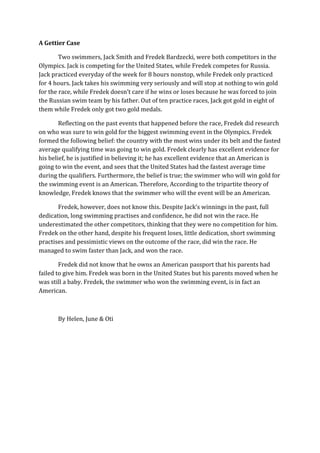
Gettier case
- 1. A Gettier Case<br />Two swimmers, Jack Smith and Fredek Bardzecki, were both competitors in the Olympics. Jack is competing for the United States, while Fredek competes for Russia. Jack practiced everyday of the week for 8 hours nonstop, while Fredek only practiced for 4 hours. Jack takes his swimming very seriously and will stop at nothing to win gold for the race, while Fredek doesn’t care if he wins or loses because he was forced to join the Russian swim team by his father. Out of ten practice races, Jack got gold in eight of them while Fredek only got two gold medals.<br />Reflecting on the past events that happened before the race, Fredek did research on who was sure to win gold for the biggest swimming event in the Olympics. Fredek formed the following belief: the country with the most wins under its belt and the fasted average qualifying time was going to win gold. Fredek clearly has excellent evidence for his belief, he is justified in believing it; he has excellent evidence that an American is going to win the event, and sees that the United States had the fastest average time during the qualifiers. Furthermore, the belief is true; the swimmer who will win gold for the swimming event is an American. Therefore, According to the tripartite theory of knowledge, Fredek knows that the swimmer who will the event will be an American.<br />Fredek, however, does not know this. Despite Jack’s winnings in the past, full dedication, long swimming practises and confidence, he did not win the race. He underestimated the other competitors, thinking that they were no competition for him. Fredek on the other hand, despite his frequent loses, little dedication, short swimming practises and pessimistic views on the outcome of the race, did win the race. He managed to swim faster than Jack, and won the race.<br />Fredek did not know that he owns an American passport that his parents had failed to give him. Fredek was born in the United States but his parents moved when he was still a baby. Fredek, the swimmer who won the swimming event, is in fact an American.<br />By Helen, June & Oti<br />